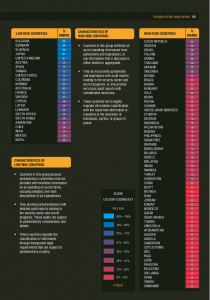Secret budgets are pools of money spent on defence and security items or services that are not openly disclosed to the public. They may cover new weaponry, covert campaigns, sensitive equipment, and troops for secretive operations. In cases where the intelligence service’s budget comes from the defence budget, they may also relate to covert aspects of the service’s operations. On the other hand, secrecy gives corrupt actors a useful way to cover up illicit movements of money divorced from any oversight.
At the ‘good practice’ end of the range, a country like Norway has zero secret defence budget: none at all. The more open countries have secret defence budgets in the range 0-4% of the defence budget.
Example: GERMANY and secret defence budgets
In 2012, EUr 1 million of the German defence budget of EUr 31.87 billion was designated for secret spending. The largely transparent budget of the intelligence services in the country means that secret budgets are very unlikely to exceed one per cent of the total defence budget.
The process of legislative oversight of such items is fairly technical but displays several clear areas of good practice that do not seem to be compromised or corrupted. For example, there is a ‘committee of trusted members’ in the Budget Committee of the German Bundestag entitled to agree or not agree with the secret expenditure and to authorise them or not. This is a cross-party committee, who will notify the fuller Budget Committee of the total amount of secret spending. This oversight is on a statutory footing, as per Article 10a of the Federal Budget Code. Their findings are given to the ‘committee of trusted members’ in the budget Committee of the Bundestag for inspection, and to other relevant individuals as specified by Article 10a of the Federal Budget Code.
Example: BULGARIA and secret defence budgets
Spending on the National Intelligence Services in Bulgaria for 2012 is reported to comprise about 1.6 per cent of the aggregate defence budget. Two committees are provided with comprehensive information on secret spending:
The Parliamentary Sub-Committee, which exercises parliamentary control over the National Service, the National Security Service and the “Military Information” Service to the Ministry of Defence. The head of the Sub-Committee has even been interviewed on radio on the remit of the committee, the structure of military budgets, and areas for reform. This indicates parliamentarians appear to recognise the need to connect with the public on their work, despite its classified nature.
Comparative country data from TI: scrutiny of secret defence budgets
 The TI analysis asks: What percentage of defence and security expenditure in the budget year is dedicated to spending on secret items relating to national security and the intelligence services? Is the legislature (or the appropriate legislative committee or members of the legislature) given full information for the budget year on the spending of all secret items relating to national security and military intelligence? Are audit reports of the annual accounts of the security sector (the military, police, and intelligence services) and other secret programs provided to the legislature (or relevant committee) and are they subsequently subject to parliamentary debate? In law, are mechanisms for classifying information on the grounds of protecting national security and military intelligence? The results for the 82 countries are shown opposite – very few countries score well.
The TI analysis asks: What percentage of defence and security expenditure in the budget year is dedicated to spending on secret items relating to national security and the intelligence services? Is the legislature (or the appropriate legislative committee or members of the legislature) given full information for the budget year on the spending of all secret items relating to national security and military intelligence? Are audit reports of the annual accounts of the security sector (the military, police, and intelligence services) and other secret programs provided to the legislature (or relevant committee) and are they subsequently subject to parliamentary debate? In law, are mechanisms for classifying information on the grounds of protecting national security and military intelligence? The results for the 82 countries are shown opposite – very few countries score well.